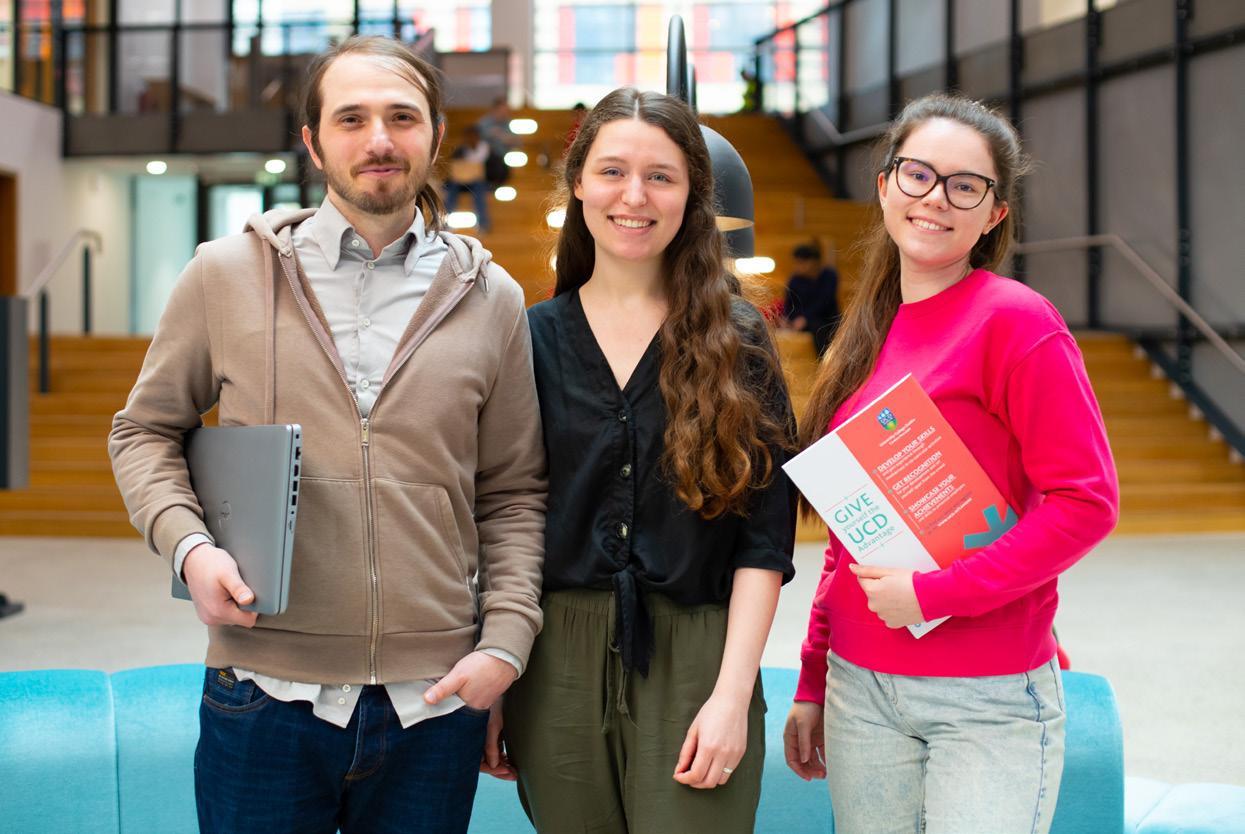UCD College of Social Sciences & Law 2024/25

Coláiste na nEolaíochtaí Sóisialta agus an Dlí



• Skills
• Employability
• Careers
UCD.ie/careers





Coláiste na nEolaíochtaí Sóisialta agus an Dlí



• Skills
• Employability
• Careers
UCD.ie/careers



100% of students would recommend UCD Advantage to a friend
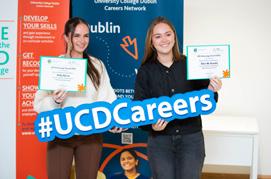


The UCD Advantage Award is your chance to get recognition from UCD for skills, knowledge and experience that you have gained through participation in co-curricular activities. Whether you are a part of a UCD Society or sports team, volunteer your time with a charity or have done a summer internship, UCD wants to acknowledge your contribution and development.
UCD students involved in co-curricular activities can apply. Your activities can range from clubs, societies, volunteering, internships, part-time work and hundreds more.
Completing the award helps you to articulate all the amazing transferable skills you have developed. Employers are looking for well-rounded students and UCD Advantage will help you stand out from the crowd. A great addition to your CV!
Pre-register for the UCD Advantage Award on SISweb at any point during your time at UCD.

Table of Contents
About this Guide
Foreword & Meet your Career & Skills Consultant: Leona Barry
Welcome to UCD Careers Network
We can help you...
Getting Started
Key Dates for your Diary 2024/2025
Get the UCD Advantage
The Future of Work
Impactful Applications
Ace that interview!
Make Social Media Work for You
LinkedIn Checklist
UCD College of Social Sciences
Eminently Employable!
Get involved
Tips for Social Sciences Students
Enhance your Employability with an Internship
What are Graduate Programmes and should I apply for them?
Law
What are Graduate Employers Looking For?
Strategies for Skills Development
Develop Professionally with an Insight Experience
Preparing for Interviews & Assessment Centres in Corporate Firms
What can you do if you don’t want a career in corporate law?
Doctoral and Research Masters Students (Graduate Researchers) Get in

UCD Careers Network sets out to offer services to all students at UCD to enable them to consider and plan their future career. We do this in many different ways, for example, by offering career consultations, credit bearing modules in career development, non-credit bearing programmes and Awards such as the UCD Advantage and a sophisticated online platform called MyCareer, packed full of information, job vacancies, e-learning and AI assisted CV development and online practice job interviews. This guide illustrates one approach taken by your team of expert Career Practitioners at UCD Careers Network to bring to you a comprehensive career toolkit. Please use this career guide in conjunction with MyCareer which you will find at www.ucd.ie/careers
– DR. DAVID FOSTER, UCD DIRECTOR OF CAREER DEVELOPMENT AND SKILLS AND ASSOCIATE EDITOR OF THE BRITISH JOURNAL OF GUIDANCE AND COUNSELLING
At the front of this guide you will find information on how we can support you during your time at UCD and beyond. You will also find information and advice to help you successfully navigate the employment market, including how to get started on your career planning and how to make great job applications.
The second half of the guide has been tailored to the needs of students of your College. We will provide you with insights into the employment market, in addition to advice on building and articulating the key skills that employers look for in graduates. We’ll outline the career and employability supports available within your College and through a series of short profiles, showcase the great things that students and graduates of your College have been doing to progress along their chosen career paths.
We want this guide to be practical and suited to your needs, and maybe a source of inspiration and ideas.
As always, we would love to hear your feedback as we strive to continually improve our service, so if you have any feedback on this year’s guide or any suggestions for what we should include next year please drop us an email at: careers@ucd.ie
OK, let's start!
In addition to the supports and services provided by UCD Careers Network, gradireland.com is a source of helpful information and resources to assist you in your career planning.
It has been developed collaboratively by a range of organisations including the Association of Higher Education Careers Services (AHECS), as well as universities across Ireland and the UK.


Dr. David Foster
UCD
Director
of Careers, Employability and Skills
Associate Editor of the British Journal of Guidance and Counselling
The team at UCD Careers Network is committed to enabling students, recent graduates and Postdoctoral Researchers to consider their future and plan ahead. The world is on a trajectory of constant change, including the workplace. Those people whose job it is to look to the future of work and make predictions, tell us that students will enter careers which do not yet exist when they graduate. The challenge for professional units like UCD Careers Network is to partner with faculty and students to ensure success and smooth transitions into work and to lay the foundations for successful career management in the future. In 2023, the World Economic Forum produced a report- The Future of Jobs, in which the top 10 skills most in demand are listed as: Empathy and active listening, Analytical reasoning, Technological literacy, Quality Control, Leadership and Social Influence, Self-Management and Professionalism, Curiosity and Lifelong Learning, Dependability and attention to detail and Problem Solving. By 2027, it is suggested that the skills most in demand will include Analytical thinking, Creative thinking, Artificial Intelligence and Big Data.
Please take the time to read this Career Guide which is a useful resource as you consider what comes next after your time at UCD comes to an end. Whether you are just beginning to think, have some ideas or already have a career choice or job offer in place, the Careers Network will help you develop the skills, competencies and attributes needed to transition from university to the next stage in your career. While the world will most likely never stop changing, with some thought and by making use of resources available at UCD, you will succeed and hopefully, stay connected to UCD though our Alumni associations.
At this time, please accept my best wishes for the future and success during your tenure at University College Dublin.

Leona Barry Career & Skills Consultant
Hello and welcome! My name is Leona, and I am the Career and Skills Consultant for the College of Social Sciences and Law. Working as part of a dynamic team in the UCD Careers Network at University College Dublin since 2014, I have had the opportunity to work closely with many Schools and Colleges including the Michael Smurfit Graduate Business School, the College of Engineering and Architecture and the UCD Sutherland School of Law while also developing relationships and engaging with key graduate employers.
With over fifteen years + professional experience in a career development role within Higher Education and in large recruitment organisations as a Senior Recruiter I also hold a Master’s degree in Business Studies from Dublin City University and a Postgraduate Certificate in Career Education, Information and Guidance in Higher Education from the University of Warwick. More recently, I acquired a Digital Badge for Universal Design in Teaching and Learning from UCD and was also a successful participant of the prestigious UCD Aurora Leadership Programme and current member of the Association of Higher Education Careers Services and the Association of Graduate Careers Advisory Services.
In my role, I coordinate a number of Career Development modules within the College of Social Sciences and Law supporting students in building their selfefficacy, self-confidence, and self-esteem helping students join the dots on their journey from university to the workplace.

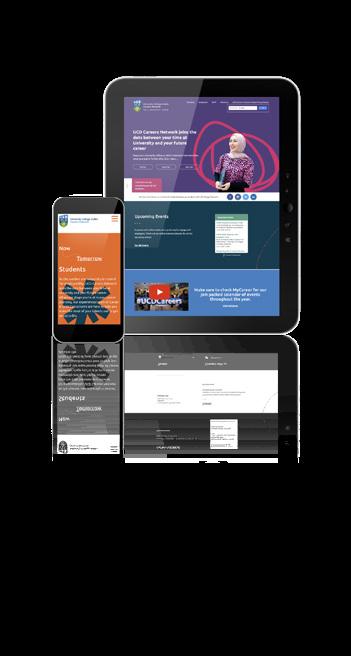
Take a look at our website www.ucd.ie/careers/ We hope you like it!

As the number one university in Ireland for employability, UCD Careers Network joins the dots between your time at university and your future career. Whatever stage you’re at in your career, our experienced team of Career and Skills Consultants are here to help you make the most of your talents and to help you get ahead. Whether you’re an undergraduate or graduate student, it’s never too early to ask for help. We can help you to discover more about yourself, navigate the complex job market and introduce you to employers through our extensive network.

“Very helpful, friendly and welcoming staff."
"Highly professional, focused and informed service."
"Wonderful service and very beneficial to students. Informative, approachable and helpful. True advocates of students."
"Excellent service...helped me make a plan in 5 minutes, priortising my goals. This was an extremely reassuring process for a nervous final year student."
"Really helpful and insightful, making the application process more accessible."

MyCareer is a content-rich careers management platform featuring interactive tools, e-learning content and the latest job opportunities. It is designed to help you navigate today's job market and move your career forward with confidence.
This online career management platform is also your one-stop-shop for events, career information and 1-2-1 career appointments. You can access MyCareer via UCD Connect or the UCD Careers Network website.
Over one third of UCD students maintain part-time work alongside their degree. Part- time work can be very useful, for generating income for yourself - as well as building transferable skills.
Consider what hours you can work, be realistic about how much time you can offer that won’t affect your studies. International students should also ensure they understand how many hours a week they are entitled to work.
Narrow down the sectors you will prioritise in your search by considering the transferable skills you may gain from different types of part time jobs. This could range from e.g. developing commercial awareness through retail work, customer service skills through hospitality, administrative or IT skills through office based work or customer support.
To get started, there are a number of websites you can visit:
• UCD Students Union Job Board - advertising on and off campus part time work
• MyCareer Vacancy Portal - advertising graduate, internship and part time roles (filter by PT Work)
• UCD Careers Networking LinkedIn Newsletter – Subscribe to keep up to date on opportunities for UCD students
• LinkedIn Jobs – filter by part time/entry level
• Indeed, Jobs.ie, Monster.ie - national jobs boards with PT filters
• Work At UCD Job Board - mainly advertising full time roles within UCD, but can occasionally also advertise contract and part time opportunities
Consider going directly to employers who are not advertising. It can be simplest to print a copy of your CV and just walk in with it (when they aren’t busy). Use your network to find out about opportunities that may not be advertised. Consider applying to roles based on the UCD campus. For hospitality work, there are over twenty coffee shops and restaurants on campus.
There are some paid campus leadership roles that may offer a small number of regular hours: UCD Residential Assistants, Student Library Guides, UCD Global Guides, UCD Career Ambassadors, UCD Student Ambassadors, UCD Science Student Leader, and UCD Access Student Leaders.
Some Schools offices have Research Assistant roles available for suitable students. Similarly tutor roles within the UCD Writing Centre, the UCD Maths Support Centre or the UCD Computer Science Centre may be a fit for students with specific skill in these areas, such as PHD students.
Edit your CV specifically for part time roles. Include a brief profile at the top outlining your availability, relevant skills or experience.
For more information on CV’s, check out our CV resources on MyCareer including CV360 to get instant feedback on your CV, and then book a 20 minute appointment with our Career Consultants to have your CV reviewed.

CV360 scores your CV against more than 50 checks that commonly annoy a hiring manager. You get instant, detailed feedback so you can optimise your CV and significantly boost your chances of getting to interview stage.
Interview360 features a range of mock interviews you can take to really test your ability to come up with strong, confident, well-thought-through answers under time pressure. You’ll get instant feedback and advice, and every question you answer will make you a stronger candidate.
There's a huge range of resources on our MyCareer platform, so if you're not sure where to start, take the CareerEDGE+ profile quiz. CareerEDGE+ is a personal development tool that should help you to identify possible areas for development over the next year.
Whether you are beginning your career, have many years of experience or are unsure of your career direction, reflecting on your motivations, preferences, values and working style can be useful when considering your current role and desired career path. MyCareer hosts a wide range of assessments including Personality Insight, Motivation at Work, Management Skills and Strengths. The assessments take 10-15 minutes each to complete. At the end of each assessment you can access your personal report, with practical, tailored, recommendations to apply to the workplace.

Whether you have no plan, some plan or a clear plan, we can help you figure out the next steps. Check out the interactive career planning tool on our website for tailored tips and advice. If you would like to speak to a Career and Skills Consultant, sign up for a 20 minute career coaching session via MyCareer.
Our Career and Skills Consultants deliver a range of engaging and interactive modules, workshops and seminars for students across all disciplines and stages. These cover everything from developing a stand-out CV or perfecting your interview techniques to developing the key skills that graduate employers are seeking, like leadership, teamwork, presentation skills, commercial awareness etc. Check with your Programme Office to find out about bespoke career development and employability support in your area or contact your Career and Skills Consultant
We advertise thousands of graduate and internship opportunities. Check out the vacancy portal on MyCareer and follow us on Facebook, Twitter, Linkedin or Instagram to get up to date notifications of exciting new opportunities. If you are considering an internship in the USA, we’ve also got you covered! Check out our comprehensive database of US internship opportunities; CEI Internships.
We will be holding our usual recruitment fairs; Business Finance & Management; Science, Engineering & Technology; Law and Internship. We'll also hold a range of recruitment events featuring the top graduate employers and insightful sectorbased panel discussions. With employers from across all sectors, there really is something for everyone and countless opportunities to connect and grow your network.
We are active across a range of social media platforms. We use these to promote opportunities and events and generally keep you up to speed on all things careers and employability related. Follow us to stay in the loop. In addition to helping you connect with employers, we also work to ensure you are well-prepared to bag that internship or graduate job. Get your CV and cover letter in shape by using the tools and resources on MyCareer and then have one of our team look over them at a 1-2-1 consultation. Attend an interview skills workshop, practice your interview performance and get valuable personal feedback.
We are active across a range of social media platforms. We use these to promote opportunities and events and generally keep you up to speed on all things careers and employability related. Follow us to stay in the loop.
We know that getting started can be stressful and taking those first steps can be daunting. Rest assured that you are not the only one who is unsure about what to do next and we are here to help you move forward from wherever you are currently.
It’s never too soon to engage with us – whether you are in first year or final year, the sooner you make contact, the more we can do to help.
We have developed an interactive career planning tool, aimed at helping you move forward. All you need to do is think about where you are currently in relation to career readiness – do you have no idea what you want to do or how to go about it? Or do you have some ideas but there are gaps you need help filling in or maybe you are very clear on what you want but would value a sounding board.
Wherever you are at right now, just go to the Careers Network website, choose the option that best reflects your current state of career readiness (No Plan, Some Plan, Clear Plan) and you will receive a set of tailored suggestions for supports, resources and activities that can help you move forward.


We know you are busy and there is a LOT happening, particularly in trimester 1...BUT here are a few key dates for your diary. Please note that these are the highlights - for the full event listings, including details of times, venues and registration information, make sure you check out MyCareer. New events are being added to our MyCareer calendar all the time, so don’t miss out!
Student Orientation Week & Freshers Week – 16th-20th September 2024
If you are new to UCD, Orientation week is a great time to find out all you need to know. Keep an eye on our social media pages for events popping up over the week!
UCD Careers Network Open Day – 18th September 2024
Meet the team and find out all the ways we can help you during your time at UCD, and beyond! We have a range of activities and competitions planned on our Instagram page. Follow us here!
UCD Science, Engineering & Technology Fair – 30th September 2024
This fair is about all things STEM, from IT to Pharma to Engineering Project Management. If you are interested in a Science, Engineering or Technology related career, sign up on MyCareer today!
UCD Business, Finance & Management Fair – 1st October 2024
for your diary 2024/25
This fair is for anyone who is interested in a career in Business, Finance, HR, Marketing, Management, Accounting, etc. Top graduate employers are interested in meeting students across all academic disciplines, so whether you are studying Ag. Science or Arts (or anything else) come along to find out about the exciting opportunities on offer.
UCD Law Fair – Wednesday 2nd October 2024
Did you know that Law firms recruit students from across all academic disciplines? You don’t need to be studying Law to pursue a career in Law. Meet some of the top Law firms in Ireland, the UK and further afield. Join on the day to see if a career in Law is right for you.
UCD Internship Fair – 28th January 2025
Internships are a fantastic way to gain work experience and find out whether a particular company or sector is right for you. Lots of UCD programmes have built-in academic internships but lots of students also do summer internships. Join to meet employers, across a variety of sectors who have exciting summer opportunities on offer.
UCD Michael Smurfit Graduate Business School Spring Career & Internship Fair – Tuesday 25th February 2025
If you are a Smurfit student who is interested in working in Accountancy or Consulting this is the event for you!
UCD Research Careers & Employer/Funders Networking Event – Tuesday 13th May 2025
A small group of employers who have previously hired UCD PhDs and/or Postdocs come together for an event which includes flash presentations, alumni panels and plenty of time for networking.
Career Essentials – Trimester 1 2024
Career Essentials workshops are a great way for you to get started on your career journey. These short workshops take you through: Career supports that are available to you at UCD and how to use them; Ways to build your skills; Setting up a LinkedIn profile; What to include on a CV/Cover Letter; How to prepare for an interview.
The Future Skills Programme is an 8 week programme of employer-led, interactive workshops, covering topics ranging from resilience to technological literacy - based on the key skills employers have identified as being crucial to success (World Economic Future of Jobs Report, 2023). On completion of the programme, including a related reflective assignment, you will be awarded a certificate of completion – another great achievement to add to your CV!
Leadership
• Chairing a student society or a committee
• Captaining a sports team
• Taking responsibility for organising an event
• Being a team leader at work Initiative
• Writing your own blog
• Finding creative ways to raise funds as a volunteer
• Participating in student competitions
Adaptability & Flexibility
• Combining study and part-time work
• Travelling or studying abroad independently
• Managing multiple extra-curricular activities
Teamwork
• Actively participating in student projects
• Commitment to a team-based sporting activity
• Ability to work with others successfully in your part-time job
How can you develop your skills? If you are not sure where to start, check out the Core Skills Courses on MyCareer. It is important to begin building experiences and skills to complement the skills you are developing in your degree.
Planning & Organisation
• Arranging travel itineraries
• Managing competing demands on your time – studies, part-time work and other commitments
• Organising fundraising and other events
Problem Solving
• Overcoming obstacles to achieve a personal goal
• Finding creative solutions to workplace problems
• Participating in student problem-solving competitions
Commercial Awareness
• Keeping up to date with business papers, magazines and social media activity for businesses you're interested in
• Joining relevant student societies e.g. Investors & Entrepreneurs Society
• Learning about the business in your part-time job
Oral Communication
• Giving presentations as part of your course
• Becoming a UCD Peer Mentor or Student Ambassador
• Running a meeting or event
• Dealing with customers via your part-time work
Get the UCD Advantage
There are ample opportunities at UCD to develop skills through involvement in clubs, societies, work experience, mentoring and volunteering. You can also use your co-curricular activity as the basis for an application for the UCD Advantage Award.


Stand out from the crowd
At the Careers Network, we meet lots of students who are doing great things but struggle to articulate the development they have gained. For example, you may be a great Peer mentor, Class Rep or Campus Ambassador but you don't know how to communicate the value of this to a potential employer in your CV or at an interview? If this is something you struggle with, then check out the UCD Advantage Award.
UCD Advantage formally recognises the skills, knowledge and experience that UCD students gain through participation in co-curricular activities, on and off-campus. Participation will encourage you to expand the breadth of your co-curricular activity and get involved in things that you may not have considered previously. This can open up a world of opportunity in terms of meeting new people, experiencing new situations and developing a whole host of new skills. Crucially, it will also help you to effectively articulate your skills, attributes and experience, in applications and at interviews.
Recipients of the UCD Advantage Award will be presented with a digital certificate once their application is approved. The digital certificate can be added to their LinkedIn profile and CV. The physical certificate will be awarded to the achievers at a felicitation ceremony and the UCD Advantage Award will appear on their Diploma Supplement at graduation. The Advantage Award can be listed in the “Achievements'' section of the CV.

recommendation
100% of students would recommend the UCD Advantage Award to fellow students. You can register for UCD Advantage at any time, quickly and easily via SISWeb. For more information go to: www.ucd.ie/careers/advantage
Here’s what Advantage Award Achievers have to say about the experience.

Ada Ruohonen, Stage 4
"The UCD Advantage Award was a great way to look back on my experiences and reflect on the transferable skills I had learned by taking part in these activities. It also allowed me to understand what future employers might be looking for when applying for a new job. Overall, the award was a great way to think about my achievements and be proud of myself!
Advice for Students: I would absolutely recommend taking part in the UCD Advantage Award. It is a wonderful opportunity to get recognition for tasks that might otherwise go unnoticed. Besides, it is a great way to come to realise how much you have learned by taking part in extracurricular activities, and how they have been incredibly beneficial in improving your transferable skills for the future. Overall, it is absolutely worth the effort!"

Richard Otroshchenko, Stage 1
"Having an incentive to seriously reflect on my experiences was the most valuable part of the award. I was able to put into words how my involvement in UCD helped develop both my personal and professional skills. I believe that my ability to clearly express all the challenges I faced as Class Rep was a key contributor to me securing an internship for the Summer. Advice for Students: I would absolutely recommend the UCD Advantage Award to anyone who wishes to stand out from the crowd when searching for internships.Additionally, my activities have also allowed me to make new friends and experience new things. Just don’t feel restricted to doing only two activities; there’s every reason to get involved in as many things as you’d like!"
797 students achieved the Advantage Award in the academic year 2023/2024
It’s likely that for many of you, the working environment you enter upon graduation will be entirely different to the environment that existed when you entered university. In the space of a few years, the world of work has changed rapidly, without precedent. The pandemic accelerated recent trends in remote working, AI, MedTech, e-commerce, automation and edtech. According to the Professional Services Firm PwC, “today we are living in an era of fundamental transformation in the way we work.”
Not since the Industrial Revolution have organisations had to think about where, when, and how employees undertake their roles.
The concept of a five-day, 40-hour work week at a fixed location is nearly a century old. It was invented by Henry Ford in 1926 to serve manufacturing plant assembly lines. It’s possible that the working environment you enter will still be in a state of flux as organisations and entire sectors continue to adopt new ways of working such as remote, hybrid, flexible working, or agile working practices.

One of the most important skills you will need is adaptability. It is essential for navigating the changes ahead. It’s impossible to entirely predict exactly the skills that will be needed even five years from now, so organisations and employees need to be ready and able to adapt to rapidly changing patterns of work, working structures, use of technologies and AI as well as the impact of geo-politics and climate change.


Some of the below terms are now widely used in job advertisements for internship or graduate roles so be sure you have a clear understanding of the company work practices before applying. Check out the list below to familiarise yourself with these terms.
A remote employee is someone who is employed by a company but works outside of a traditional office environment. This could mean working from a local coworking space or from a home office.
A hybrid working model is when an employee works part of their time in the workplace provided by their employer and part of their time from home or anywhere else other than the normal place of work. Also referred to as e-working or flexible working.
Agile working is a way of working in which an organisation empowers its people to work where, when, and how they choose. It is generally agreed with your line manager and may differ across teams in an organisation.
Here are our top five tips for putting together an impactful application:
1. Start by analysing the job advert so that you have an in-depth understanding of the recruiter’s requirements.
2. Always tailor your CV to show that you meet the employer’s needs by matching your skills and experience to their stated requirements.
3. Prove that you are a strong candidate by giving examples of your skills and achievements.
4. When assessing the content of your CV ask yourself ‘so what?’ after each statement. If it isn’t really saying anything or is not relevant, does it have a place on your CV?
5. Don’t cut corners when it comes to your cover letter. This is an important part of your application as it allows you to demonstrate your particular interest in the organisation and role, and shows that you’ve done your research!
Your CV and cover letter or your online application form are your sales and marketing tools. The quality of your application determines whether or not you get an interview. This is your opportunity to highlight your strengths, skills and experience to a potential employer and set out what makes you a great fit for the role. Tailoring your CV, cover letter or application to the requirements of the role is critical – a “one size fits all” approach won’t do you any favours.
Reviewing the e-learning content 'CVs and Applications' on MyCareer is a great way to get started. It will quickly bring you up to speed on the essentials of putting an impactful CV and cover letter together. You can also attend one of our effective applications workshops. Check with your Career & Skills Consultant to see if there's one scheduled for your particular programme.
When you have a draft you are reasonably happy with, use the CV360 tool on MyCareer to receive instant feedback and advice to improve your CV. If you need further support tailoring your application, you can book a 1-2-1 consultation and get some expert advice and feedback from one of the team.
Your cover letter should be in formal letter format and no more than one page in length. It should address the following points:
• Introduction/why you are writing
• Summary of your key skills and experience relative to the role (this should compliment what's in your CV, not repeat it verbatim). Outline why you are a great fit.
• Why you want this job or to work for the company? Show your enthusiasm and demonstrate that you have done your research.
• Closing/sign off

Heading
Personal Profile
Summary (optional)
Education
Work
Experience
Skills Section (optional)
Interests & Achievements
References
Final Checks
• Does your name appear in bold at the top of the page (not the words; Curriculum Vitae)?
• Are your contact details, including phone number and email address, clearly visible under your name?
• Is it concise, tailored and relevant to the specific role you are applying?
• Is it specific and evidence-based as opposed to generic or clichéd?
• Have you clearly stated your qualification titles, institutions attended and start and end dates?
• Have you included your current GPA/expected award classification?
• Have you included a select number of the modules most relevant to the specific role?
• Have you mentioned any project you have completed that is relevant to the specific role?
• Have you listed your most recent qualifications, before listing older qualifications e.g., your Leaving Certificate?
• Have you clearly stated the job title, company/organisation name and stated start and end dates?
• Have you outlined your key responsibilities (not a task list) and achievements using bullet points?
• Does each bullet point start with a strong action verb and give specific details, including metrics where possible?
• Have you clearly articulated skills and experiences relevant to the role you are applying for?
• Have you listed your most recent job first and then worked back?
• Have you included only skills that are relevant to the role you are applying to?
• Have you backed up your claims with specific evidence and examples?
• Do you provide specific information where possible e.g., levels of language proficiency, IT software packages, coding languages, etc.?
• Do the interests/achievements included demonstrate relevant transferable skills?
• Have you included relevant voluntary work, society memberships or sports teams?
• Have you included membership of any professional bodies or relevant organisations?
• Have you either stated “References available upon request” OR given referees’ names, job titles and contact details?
• If you have given referees, is one an employer and one an academic lecturer?
• Is your CV 2 pages or less?
• Is it easy to read e.g. font size 11 or 12, with clear headings and subheadings?
• Have you used bullet points instead of paragraphs?
• Have you avoided generic statements and instead used specific examples to support claims?
• Have you had someone else proof-read it?
If you are invited to interview it means that ‘on paper’ you seem like a good fit for the role and the potential employer would like to validate this by finding out a bit more about you. An interview also provides you with the opportunity to evaluate whether the organisation and role are right for you.
Interview360
Interview360 features a range of mock interviews you can take to really test your ability to come up with strong, confident, well-thought-through answers under time pressure. You’ll get instant feedback and advice, and every question you answer will make you a stronger candidate.
Preparation is essential to successful performance at interviews. The more prepared you are, the more confident you will feel. It is vital that you research the job and the organisation thoroughly, using all available resources (for example the company website, annual reports, strategy documents, LinkedIn, Google News search etc). Anticipate possible questions, particularly those relating to the skills and knowledge sought; consider how you will respond to these and what evidence you can provide to convey your suitability. Prepare examples to illustrate your key skills and competencies.
Find out who will interview you, the length of the interview, and if tests or other selection methods will be used. Before the interview, make sure you read through your copy of the application form or CV that accompanied your job application – be clear on what you wrote as you may be asked to elaborate further at interview.
Make sure to review the e-learning content for 'Interviews' on MyCareer which goes through all the do's and don'ts of a successful interview and contains lots of helpful advice on navigating different types of interviews and making sure you put your best foot forward.

Here are a few of our top tips:
Many interviews are now competency-based. This means that the questions are focused on eliciting from you specific examples that evidence relevant competencies or skills, for example; teamwork, problem-solving, commercial awareness, leadership etc. They usually take the following type of format –“Tell me about a time when you worked effectively as part of a team”, “Give me an example of a challenging problem that you solved” or “Have you ever led a project? Tell me about that experience”. When faced with these types of questions, the key things to remember are:
1. Use a specific example. Do not talk about what you would do or what you usually do in these types of situations. Have a bank of examples prepared that illustrate and evidence the key competencies that the employer is likely to be looking for.
2. Use 'I' rather than 'We'. When you say “We did xyz” it is not clear to the interviewer who actually did the work – did you draw up the project plan or did you just stand there watching while your team-mates did it? The interviewer needs to be able to see your specific contribution so it’s important to use the first person.
3. Use the STAR approach (Situation Task Action Result) to answer questions. This will help to ensure that you answer competency-based questions in a clear and structured manner, giving the interviewer what they are looking for.
Situation – First give the interviewer some context and background. Keep it concise though – this should just give them enough such that they understand what your example is all about.
Task – Describe your role or goal – what was required of you? What was your specific remit? Again, keep this fairly concise.
Action – Spend more time on this. In a logical, structured fashion, talk your interviewer through the actions that you took to achieve your goal. Remember to use “I”.
Result – Describe the outcome. Ideally give examples that have a positive outcome that showcases the impact of your contribution. You can also talk about what you learned from the experience and how you have applied or would apply this learning in the future.
Dress for success – even if the workplace has a casual dress code wear professional attire for your interview.
Breathe! Do some breathing exercises to calm your nerves. Remember that it’s completely normal to feel nervous.
Greet your interviewer(s) with a smile, a confident handshake and make good eye contact. Convey energy and enthusiasm.
Listen carefully to the questions and ask for clarification if required.
Maintain good posture and be conscious of your body language.
Stay calm and take a moment to compose your thoughts before answering any tricky questions.
Have a few questions prepared to ask the interviewer at the end – show them you are interested in their company and the role.
Did you know you can book an appointment with UCD Careers Network to have your LinkedIn profile reviewed?
First steps…
• Follow companies or accounts of interest on LinkedIn, Facebook, Instagram, Twitter & YouTube.
• Follow services that can support your career development such as; UCD Careers Network, GradIreland, NextStepSupport and Prospects.
• Make sure your own social media profiles are ready to be viewed by a potential employer. If not, consider keeping them private.
• Join LinkedIn and update your profile to reflect your CV.
• Connect with your in-person network on LinkedIn, including classmates, colleagues, and friends.
Next steps...
• Follow company social media accounts to hear about their updates, products, projects and upcoming opportunities. As you scroll, you’ll be picking up nuggets of information that will help you learn more about the company and sector.
• Save posts that you find particularly interesting. You can revisit these when preparing a future application, to be easily reminded of recent company news or anything that captured your interest.
• Connect or follow people who are working in roles that interest you. You’ll get a sneak peek into their daily working life and a better idea of whether it could be the right path for you. ‘Virtual’ work shadowing could be just a tap away! @dr_niamh_shaw, @drsarahjmurphy, @pintofscienceie to name but a few!
• Subscribe to YouTube accounts that are using their platform to educate, such as Science Foundation Ireland, Engineers Ireland, RIAI (Architecture), National Gallery of Ireland and Creative Careers
• On Twitter and Instagram, follow hashtags. Keep an eye on #IrishJobFairy for part-time roles. If you’re interested in design follow #AdobeIllustrator or studying Agricultural Science, then why not follow #Agriculture?
• Create a Twitter list dedicated to accounts relevant to your subject area. Even if you only check in on Twitter every so often, you’ll be able to check in on this list to see any tweets you’ve missed, rather than searching through your entire feed.
• Share your passion. If you could be the next Mary Berry or Joe Wicks, why not use your social media to showcase your talent or passion? This could be a brilliant example of your communication skills to talk about on your CV or during your next interview! You could also take Google’s free Digital Garage course on digital marketing to learn how to build your own personal brand.
• Share your work and professional development on LinkedIn. Whether it’s a certificate you’ve earned or you’ve taught yourself how to use new software, be sure to let your connections know.
The average social media user spends 2+ hours per day across social media applications. Imagine if you could use even 10% of this time to enhance your career journey, with little effort. Well, you can take the next steps… Remember…
• Don’t spam people, always be polite and provide a personal message providing context when connecting with alumni or employers.
• Check your privacy settings, make sure you’re aware of just how much a potential employer could see with a quick google search!
• Be mindful that everything you post online could stay there forever. Think before you post or endorse.

Final Checks
• Have you included a head and shoulders photo of yourself, posed against a plain background?
• Are you smiling, looking at the camera and dressed professionally?
• Are you the only person in the photo?
• Does your headline correctly reflect your current situation (e.g. Final Year Computer Science Student & Aspiring Research Analyst)?
• Have you included a brief summary written in the first person, highlighting your key strengths and motivations?
• If you are targeting a specific sector, have you included your goals and tailored your summary to this sector?
• Have you included any additional training or certifications (e.g. Certificate in Project Management) that are relevant to the sector you have chosen to work in?
• Have you listed your most recent qualification first, before listing older qualifications?
• Have you clearly stated your qualification titles, institutions attended & start and end dates?
• Have you listed the modules completed that you think would be of most relevance to the sector you wish to work in?
• Have you mentioned any activities or societies you are engaged with in University?
• Have you listed your most recent job first and then worked back?
• Have you clearly stated the job title, organisation name & start and end dates?
• Have you outlined your responsibilities and achievements using bullet points?
• Does each bullet point start with a strong action verb and contain specific details (e.g. numbers, software used, outcomes)?
• Have you included details of any volunteering roles you have participated in?
• Have you listed at least 5 skills, which your connections can endorse you for?
• Have you searched job descriptions of interest to identify key skills to be included?
• Have you requested a recommendation from a previous employer (if available)?
• Have you included any organisations you are part of?
• Have you listed any honours or awards you have received?
• Have you included the title of (& if possible, a link to) any relevant projects completed?
• Have you listed any additional languages you speak?
• Have you added your job preferences?
• Have you added links to any relevant examples of your work e.g. pdfs of abstracts, projects on websites such as GitHub, writing samples from your blog, images of design work from Instagram etc.?
• Have you claimed your personal URL by clicking “edit public profile and URL” in the upper righthand corner of your profile?
• Have you reviewed the LinkedIn Profiles of people in roles of interest to you, to better tailor your own?
• Have you had someone else review your profile?
Social Sciences graduates are employed across the private, public and third sectors in a wide range of roles and industries, from professional services to education, social work, not-for-profits, the media and creative industries.

Which skills have you developed from the Social Sciences Skills Checklist?
• Research
• Critical analysis
• Communication
• Planning & Organisation
• Problem-solving
• Teamwork & Collaboration
• ICT
• Creativity
• Global Skills (Languages, Social and Cross-cultural Skills)
• Commercial Awareness
• Initiative & Drive
• Leadership
• Adaptability
• Resilience
• Entrepreneurial Flair
As a Social Sciences student, you will develop a wide range of skills during your time at UCD. The British Academy Report ‘The Right Skills’ identifies a common core of skills shared across social sciences, that can be grouped into 3 categories:
• Communication and Collaboration – Being able to communicate clearly and concisely with others, developing persuasive arguments, tailoring your message to the audience and working effectively in multi-disciplinary teams.
• Research and Analysis - Designing research and collecting evidence, manipulating information and data, applying qualitative and quantitative methods of analysis, and critically interpreting, assessing and evaluating findings to reach conclusions.
• Attitudes and behaviours characterised by problem solving, creativity and adaptability.
There are many additional skills that you might have developed. Take a look at the Social Sciences Skills Checklist – which skills have you developed?
It is important to remember that whilst graduates from other disciplines may possess these skills, Social Sciences students stand out for bringing the ‘human’ element that is so important.

Social Sciences graduates are able to move between careers throughout their working lives, using their skills to adapt to different industries and become successful leaders. Research shows that 44% of global leaders have a Social Sciences bachelor’s degree1.
Predicting what the future of work will look like is difficult, but Social Sciences graduates are well placed both to shape the future and to take advantage of the opportunities the future will present.
The ability to understand and interpret data developed through the study of Social Sciences is an essential feature of life in the 21st century, and with an increasingly global labour market, language skills, intercultural understanding and a global mind-set will be a crucial feature for the economy.
1 The right skills: Celebrating skills in the arts, humanities and social sciences, British Academy for the Humanities and Social Sciences (2017); pg 11.
Niamh McInerney, Director of Talent Acquisition, PwC
"Each year, PwC Ireland hires students from different degrees including Social Sciences & Law, different backgrounds and with different skill sets for our Assurance, Tax and Advisory practices. We look for a new generation of talent to bring their life skills and new ways of thinking to our business. We want the experienced beginners, the creative perfectionists and the process-driven visionaries to join us."

"I was on The Corporate Financial Services Team in Microsoft specifically with the MACC team for the entire 12 months.
My typical duties included responding to queries on Azure deals and leading collaborations with stakeholders, Resolving Azure account balance and commitment queries and executing account shortfall balance reconciliations and resolving unreconciled amounts. I also co-led the Finance Morale Corner, organizing impactful events aimed at boosting team morale and fostering a positive and collaborative work Environment.
During my time at UCD, I took several statistics classes and learnt how to use Excel extensively. These skills were instrumental in my internship at Microsoft and helped me perform my duties effectively.
I recommend choosing an internship aligned with your interests to stay motivated, networking actively to open career opportunities, and be open to continuously learning new skills. Participating in societies in UCD developed my teamwork and leadership abilities, while the Careers Network provided invaluable career advice and preparation. This combination enriched my internship experience, helping me contribute effectively and grow professionally."

You can find out more about volunteering at:
• studentvolunteer.ie/ucd
• ucdvo.org
• camara.org
• sucdsvp.org
• svp.ie
• niteline.ie
• activelink.ie
• volunteer.ie
• sucdsvp.org
• depaulireland.ie
• focusireland.ie
• aiesec.ie
When hiring graduates, employers look for students who have built upon the skills and experience they gain through their academic studies by getting involved in activities outside the curriculum and engaging with the wider university community.
For Social Sciences students there are a myriad of opportunities to get engaged and make a difference. For inspiration, check out what some of our students did during their time at UCD.
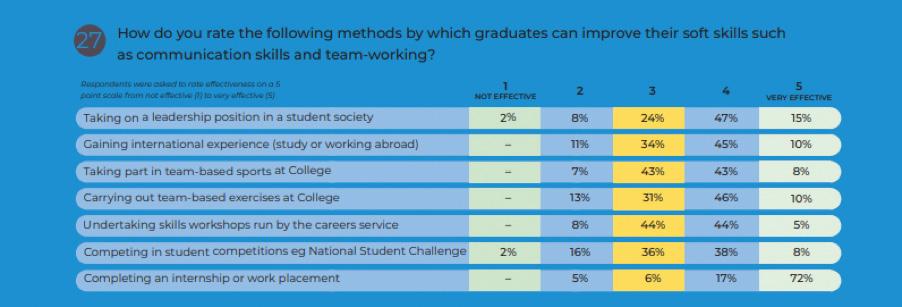


"I was part of several societies on campus and also worked in multiple jobs on campus. I was Vice President of the UCD Indian Society and Team Leader of the social enterprise society - Enactus UCD. Working with societies gave me tangible leadership skills that I could talk about in every interview to date. Moreover, volunteering and running social enterprises on campus helped me understand business ethics and team management, values that every company will look for. I worked under UCD Global as a global guide helping international students find their way around campus and Dublin. This helped me learn critical communication skills while working in an extremely diverse environment. Finally, I also worked under UCD Careers as a career ambassador that aided in my growth as a student through their workshops and networking events.
I also took up part time jobs off campus that helped me understand customer service, multitasking and time management. Through my hard work, I was able to get an internship with Deloitte Ireland in the summer of my second year where I was offered the opportunity to come back and work in the Tax department as a graduate. I was also accepted into programmes in Smurfit UCD as I graduated with a first class honours.
My advice to incoming/current students would be to grab every opportunity you can in college so you can really prove evidence to your soft skills. Time management and organisation is critical to succeeding academically and I find goal setting incredibly helpful when it comes to multitasking in college. Use all the resources you can in college to your best advantage and that’s what will help you enhance your skill set. Economics was a broad course therefore the opportunities after is limitless, so it’s important to find what you really enjoy during your time in college."

"I currently work as a marketing assistant on the Jameson International Brand Ambassador Programme Team. This involves working on the team that supports our global family of Brand Ambassador’s training and development. A key pillar of my role is attracting and engaging with students and recent graduates by showing them everything our programme has to offer. I run the social media platforms for the programme and brief agencies when we are running a campaign and our in-house creative team when we need new assets. Additionally, I work on a team that engages with local and global artists when they are visiting Dublin.
While in UCD I developed strong communication skills-time management from balancing all of my different modules and extracurricular activities as well as public speaking. Additionally, as an active member of the UCD Dance Society, I learnt what hard work, teamwork and support was. I also participated
My recommendation to UCD students would be to get involved academically and in extra-curricular activities. Whether it’s with an academic society, regular gym classes or a sports society, building a community around you is key in not only succeeding in your degree but in your college experience as a whole.
Finally, I engaged with the Careers Network through the Career Development module in Psychology. This gave me lots of useful material and tools regarding masters’ applications, CVs, interview and networking skills and was a great complement to the technical skills I learnt in the lecture hall.
My advice to all students would be to utilise the Careers Network and also apply for the Advantage Award. Taking time to do this is very beneficial to your future self in terms of boosting your CV and Masters’ applications and helps you stand out from the crowd."
A degree in Social Sciences provides many possibilities. It is important to invest time in exploring your career options so that you can make a decision that is right for you.
To help you decide on the path to take after UCD, why not participate in the Career Mentoring Programme or attend some alumni panel events to learn more about your career options. Doing an internship, work experience or work shadowing is also a great way to build skills and gain insight into a particular role, organisation or sector.
As a Social Sciences student, there are also a number of credit-bearing Career Development modules that you can take. These modules are specifically designed to help you develop employability skills and learn more about career action planning.


Student feedback for our Career Development modules has been extremely positive
Each trimester we invite UCD Social Sciences Alumni to talk about their career paths to date. It’s a great opportunity to network, learn about careers in various sectors and hear how graduates applied the skills they gained in their degree to their chosen career. Previous alumni panels have featured graduates from the Public Sector, EU Institutions, NGOs and Charities, Marketing, PR & Advertising, Sustainability, Data Insights & Research, and Creative Industries. Each year we organise 5 Recruitment Fairs, including the award winning Social Impact Week which connects professionals in the not-for-profit sector looking to hire UCD social sciences students. Keep an eye on MyCareer for details of upcoming online panel events and recruitment events.
This programme links students with UCD alumni working in career areas of interest to facilitate career learning. A mentor can help you clarify your career goals, develop your confidence and give you a rare first-hand insight into a particular role or sector. Previous mentors work in a wide range of sectors including media & journalism, diplomatic services, politics, EU institutions, education, finance, arts & culture, marketing, data analytics, government and public relations. The Career Mentoring Programme is open to second year undergraduate Social Sciences and Law students. Applications for the programme open in September, so keep an eye on your e-mail and Careers Network social media for more information.
Take
Module or Internship Course: PSY30320, SSCI20020.
SSCI20020 Career Development in Social Sciences, PSY30320 Career Development in Psychology are career development modules designed to facilitate professional development and to enable you to develop employability skills. Students gain an appreciation of how to navigate the graduate recruitment process, how to be effective in the workplace and how to take ownership of their career development. Topics covered in the module include effective job applications, Internships, CVs & cover letters, interview techniques, self-awareness, presentation skills and teamwork. Undergraduate Academic Internship and Masters Internship Preparation courses are also available to support social sciences students.
“The weekly activities supported my learning and gave me further insights into what I want to do…and the assignments were helpful and pulled all I had learned together”.
“I enjoyed the flipped class approach and that the classes were very interactive”.
“I did find the lecturers to be very helpful in explaining what life after UCD will be like”.

Clodagh Scott, BSc Sociology, Politics & International Relations

Rachel Holton, BSc Psychology
"I enrolled on the Career Development in Social Sciences module and have developed many applied skills and gain knowledge of different careers. We participated in many activities that supported our professional development including making a career action plan and a LinkedIn account, attending a careers fair and a panel discussion, completing practice interviews, and undertaking a group research project. After doing a project on the charity sector it was great to attend a UCD Careers Network event with ECO-UNESCO as part of Social Impact Week and learning how to get involved and what skills they and other environmental organisations were looking for. Furthermore, talking to a politics and sociology graduate as a career mentor has helped me identify skills I have gained. The cover letter which is an important part of an application was an area I had struggled with and through zoom calls and emails I am now comfortable writing one, knowing that it does me justice. They have also identified new areas I can look at in careers and encouraged me to put myself out there.
I recently had an interview to get onto the CW Virtual Model UN. After the practice in the module and discussions with my career mentor I was prepared and got the work experience. I have been selected as an Irish delegate which is great experience as I would be interested in working in an international organisation like the UN. I have realised that goals are important to achieve what you want in a career.
This module is different, fun and interactive. I got to know people across courses and was able to use what I learned immediately. It opened my eyes to events the Careers Network offers and the opportunities you have. A meeting at Careers Network helped me work out what direction I want to go and would recommend this to all students."
"I recently completed my final undergraduate year as a psychology student at UCD, and it has been an immensely rewarding experience. Throughout my final year, I grappled with deciding whether to continue my academic journey by pursuing a master's program or to seek employment in the field of psychology immediately after graduation. To aid in this decision-making process, I enrolled in the Career Development in Psychology module offered at UCD.
This course provided an abundance of valuable information that I might not have otherwise discovered. Weekly lectures imparted excellent interview techniques and valuable tips, while our lecturer offered significant guidance. One of the most beneficial components of the course was the careers panel, which featured four professionals with diverse experiences in psychology. Insights into their respective career paths and current roles helped me identify which branches of psychology interested me the most, and I had the opportunity to ask questions in a professional setting.
Ultimately, I decided to pursue a master's in Applied Behavioural Analysis. The skills I acquired in creating an effective CV, cover letter, and master's application were crucial to my success in securing an offer from my chosen program. Also the interview techniques we learned through MyCareer are tips I will use for the rest of my career.
I highly recommend that all students at UCD take a careers module during their studies. Not only will you gain valuable skills, guidance, and insights, but the interactive format allows an encouraging space to ask questions and find what career will suit you best."



"I decided to sign up to the Career Mentoring Programme as I am studying to be a social worker, so the opportunity to gain advice from a practitioner was immediately of interest. The programme is a golden opportunity to get a sense as to whether the area of interest to you would really match up to your expectations as a place you would like to work. In my case, I was particularly pleased with the excellent match that the programme was able to make for me between my mentor who works for Education & Welfare, Tusla, Child & Family Agency. My Mentor and I engaged straight away following the introductory evening and have been actively corresponding ever since, including two face-to-face meetings and further contact is planned.
The benefit to me has been easy access to practitioner expertise and the value of the guidance that I am receiving through that contact. It has helped me to gain valuable knowledge of the practicalities of social work in the child and family protection sphere, and has confirmed that I would like to work for Tusla as the work they do is excellent. I would strongly recommend the Career Mentoring Programme as I have found it to be exceptionally helpful and the whole experience has been positive. It is an opportunity not to be missed!"
"I found the mentoring experience extremely insightful and useful. Being able to connect with a UCD alum who shared a similar degree background and interest in work was a great way to visualise the career path I was looking into. I realised, after completing an internship in third year, that I was interested in marketing, event management and public relations. I wasn’t sure what steps to take, after my degree, to pursue these options.
This opportunity to speak about my goals and ambitions post-college to someone working in the sector I was interested in, really benefited me in terms of better understanding my strengths and the benefits I could bring to the workplace. Our mentoring meetings were a mix of zoom and in person. We also made use of LinkedIn, the UCD Alumni network and email.
The mentoring programme enabled me to highlight my strengths for the interview and application process as well as improve weaknesses. In fact, it helped me prepare for the interview that helped me get a job working in marketing in New York City! Could I have done it on my own? Potentially but…the 1:1 mentoring definitely made it more accessible. My advice for any students considering it is to go for it. The UCD alumni mentors have joined the programme because they want to be of help!"

You can enhance your employability with an internship. So explore all options and consider what you can gain from different experiences.
Internships are growing in popularity, and in the current recruitment market, employers not only look for a good degree from a top university but professional experience as well. Doing an internship will help you gain insights into a particular career path which may help you sharpen your career focus, and you’ll have the opportunity to develop your skills.

82% of employers now offer work experience and internship programmes.
Gradireland Graduate Salary & Graduate Recruitment Trends Survey 2020
Research has found that two fifths of graduate employers rate graduates with no previous work experience as either ‘not very likely’ or ‘not at all likely’ to be successful during their selection processes irrespective of their academic achievements, which shows that internships play a key role in securing a graduate role (High Fliers Research, 2020).
With these benefits in mind, where can you find an internship that matches your interests?
MyCareer and the UCD Careers Network Internships Fair are great places to start your search, and you should also check out GradIreland and Activelink (the Irish Network for Non Profit Recruitment). Many organisations recruit interns from all academic disciplines so as a Social Sciences student, you could consider internships in a wide range of sectors, including management, consulting, finance or marketing.
But what if you can’t find an advertised internship that appeals to you?
The good news is that there are many hidden opportunities waiting to be uncovered! The first step is to research where you might like to intern and make a target list. If you have a particular interest in the not-for-profit sector, for example, you could search the Benefacts database of Irish non-profits (https://search.benefacts.ie/) or consult the Directory of National Voluntary Organisations on the Citizens Information Board website.
The next step is to talk to professionals working in your target organisations, to gain insights and find out whether there are any potential opportunities. As well as using your own contacts, you can make new connections at professional events and by using LinkedIn. A great place to start is by tapping into the UCD alumni network on LinkedIn. And remember, the key to sourcing the internship you want, is to be patient and talk to lots of people.
BSc Social Sciences students have the opportunity to do an academic internship in Stage 3 of the programme, in either Trimester 1 or Trimester 2. You can source your own internship if you wish or apply to a variety of roles sourced by UCD Social Sciences from organisations across the private, public and voluntary/NGO sectors. These internships broadly reflect the different skills and knowledge you acquire during the first two years of your degree, allowing you to pursue new or longstanding interests and to apply your learning in real-world situations.
You will receive academic credit equal to a full-trimester workload (30 credits), assessed by means of reflective writing pieces and an ePortfolio. Working closely with the UCD Careers Network, Cristin O'Gorman, Internships and Employability Officer for Social Sciences, will assist students throughout the process. For details of Academic Internship Preparation Workhops make sure you check MyCareer.

Jennifer Gallivan, Head of Talent Acquisition, Deloitte
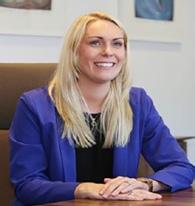
“We’re looking for real people, talented and with different backgrounds, individual strengths and perspectives. We accept applications from a wide range of disciplines including business, law, social sciences, engineering, computer science, maths, general science, technology, arts and humanities – the list goes on! The Deloitte graduate programme is about stretching your thinking, while building a career that inspires and energises you. If you’re eager to learn, collaborate and develop leadership skills early in your career, you’ll make an impact here.”
When you hear people talk about ‘graduate programmes’ you might equate this to accountancy and finance roles. Traditionally graduate programmes existed in a small number of large professional, banking and consulting firms. However, in recent years organisations across a diverse variety of sectors, from Paddy Power to the Peter McVerry Trust have developed graduate programmes that are open to students from all disciplines.
So what exactly is a graduate programme?
Essentially, it’s a structured training programme transitioning you from university to professional working life in an organisation. Over the course of your programme you receive specialist training relevant to the sector you are working in as well as support to pursue professional exams (if applicable).

Some programmes include rotations, for example on a 24-months' programme you might have 4 rotations of six month’s duration across different areas of the business. This allows you to experience different departments and get involved in a variety of projects.
Firstly, consider where your interest lies. Are you interested in HR or Marketing? Are you interested in Public Policy or working in the EU? Also consider which sectors you are interested in. Would you like to work in Retail, ICT, Research, Journalism or with a Government body? Companies such as Aldi, Lidl, Musgraves, Jameson, Vodafone, Amazon, ESRI, CSO, GLG, Salesforce, Enterprise Ireland, Focus Ireland, Trocaire, IBEC, An Post and IDA offer graduate programmes across a number of departments including HR, Digital Marketing, Business Planning, Business Analytics, Communications and Policy Development.
Start your research online by checking company websites, MyCareer and Gradireland. Take a look at For Purpose (www.forpurpose.ie) for graduate programmes in the not-for-profit sector. Once you have a clearer idea of your interests, the best way to find out more is to talk to people. Build your network by attending the Careers Network Recruitment Fairs and employer events. Come to our Alumni panel series and meet College of Social Sciences and Law graduates working across a range of sectors.

Many graduates seek careers that create social impact, but don’t know where to start. The For Purpose Social Impact Graduate Programme connects graduates with nonprofit, charity and social enterprise organisations. We recruit graduates for a range of paid roles in disciplines including law, social sciences, fundraising, communications, housing, and more. As part of our programme, you will be paired with a Mentor to guide you along your graduate journey. We also facilitate monthly learning seminars, so you can meet other graduates in similar positions. Our aim is to support you at the beginning of your graduate career. We would encourage you to be yourself and give specific reasons why you are interested in the non-profit sector using a variety of examples, including any voluntary experience.

Upon completion of my Masters study in 2021, I began a Graduate Internship Programme with the Centre for Effective Services. In my current role, I assist on research and evaluation projects with government departments, statutory agencies and community organizations. And I am able to apply the skills I further developed during my study such as critical analysis, research, presentation, communication and stakeholder engagement.
Some of the highlights of my time at UCD was my involvement in student societies such as UCD VO and Amnesty International (among others). These interactions created a platform to engage with other students with similar interests (outside Brightspace ;), which was much needed during the prolonged periods of social isolation. From my participation in these societies, I went on to volunteer with organizations such as Team Hope, Age Action, and Comhlámh- a continuation of my global citizenship education.
I also took full advantage of the Careers Network and Writing centre, which were instrumental in my career and academic development. They supported me in the preparation of my resume, cover letters, essays and several job assessments and interviews.
I would definitely advise any prospective or current student to get involved in student-led activities and also the Careers Network services. The consultants are so skilled at directing and preparing one for the world of work.


Alongside academic qualifications, graduate employers look to hire students who have been involved on-campus and gained relevant professional experience, and therefore have developed a range of professional skills and attributes that will prepare them to successfully adapt to the workplace.
What do employers look for in aspiring legal professionals?
• Current affairs İnterest and knowledge
• Commercial awareness
• Interpersonal skills
• Communication skills & the ability to negotiate
• Analytical & problemsolving skills
• Organisational skills
• Attention to detail & accuracy
• Work ethos/common sense
• Leadership
• Resilience
• Professional approach, integrity & respect for confidentiality
Commercial awareness is one of the most important attributes across all industries and in the private and public sectors alike. But what does it actually mean to be commercially aware? It essentially means having a good understanding of how a business works, their commercial objectives, as well as being knowledgeable about how the business competes in the marketplace and how your role may affect business performance. If a job advert highlights the importance of being ‘customer focused’ or having an ’entrepreneurial flair’ it is another clue that the recruiter values commercial awareness in candidates.
Graduate recruiters want students to demonstrate a range of skills or competencies from leadership, teamwork and interpersonal skills, to problem solving, critical thinking, project management and communication skills. Being creative, resilient and having global skills (such as languages and intercultural awareness) are becoming increasingly important.
However, top graduate employers sometimes find that students lack the skills that they require. The 2024 Gradireland Graduate Salary and Graduate Recruitment Trends Survey shows that the largest perceived shortfalls relate to Resilience, Initiative and Commercial Awareness..
So, with this in mind, you need to make sure that your skills are up to scratch. But how can you develop your skills? See page 36 for Strategies for Skills Development.
Check out the range of ‘Core Skills Courses’ on MyCareer.

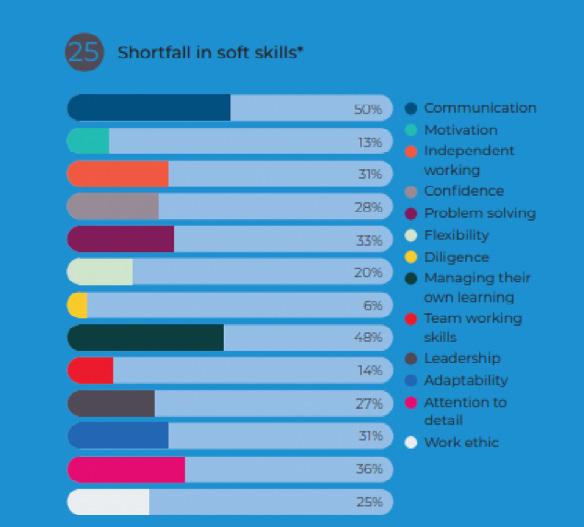

AJ Bontoyan, Early Careers Recruiter
"We thoroughly enjoy engaging with and recruiting UCD students each year. When it comes to our application process, strong academics are very important to us. However, we acknowledge that this isn’t all that matters. We look at students’ past work experience, their skills, their hobbies, and extracurricular activities, and what makes them unique. Some skills that we look out for on application forms are teamwork, attention to detail, communication, commercial awareness, and problem solving. The best way to show us that you have these skills is through your past experience, be it travelling, working, sports or being a part of societies in college. Work experience in the legal sector is helpful but not essential. We value all work experience.
When completing an application, be sure to research what makes McCann FitzGerald LLP different to other Firms. Be true to yourself when you are completing an application form. We are recruiting trainee solicitors, and we don’t expect you to know everything about the world of corporate law but your evident interest in the area would be highly beneficial. We will provide you with an abundance of training when you join us that will further equip you for a successful career as a corporate lawyer."
To be successful in recruitment processes you need to give specific examples demonstrating your skills and attributes, because just saying you can do something is not enough! Graduate recruiters from the top employers have told us that students can struggle to demonstrate their skills. The best way to develop a range of examples is to get involved in activities in UCD and beyond, and in the current climate this may mean looking virtually.
So, what actions can you take to improve your skills?
Take part in the Legal & Professional Skills Module (LAW10420)
This module for first year students is focused on supporting you to develop a range of skills and aptitudes including commercial awareness, teamwork, presentation skills, professional written communication, and time management. Students who took the module said:
• “Legal writing and career related topics were very helpful”.
• “The career strategy was really useful as it set out a broad road map for my future. This is ideal as we must plan ahead”.
• “I found the personality assessment interesting as it helped me identify areas I need to work on”.
Attend UCD Events
UCD Careers Network organises a wide range of events each year that will give you an opportunity to gain career insights into a range of career paths, meet UCD alumni, and graduate employers looking to hire UCD talent. Each year there are 5 Recruitment Fairs, employer & alumni events. Be sure to attend Set for Success, an employer-led skills programme designed specifically for law students. To find out more, check MyCareer.
Get Involved with Clubs and Societies
Join groups of interest e.g. Student Legal Service (SLS) and the Students Management Fund and take on positions of responsibility.
Help out locally with a cause that interests you or consider gaining experience further afield by giving your time online. Peer Mentoring opportunities exist in UCD and you can source other roles at www.studentvolunteer. ie/ucd You can use your experience to apply for the UCD Advantage Award.
Your opportunity to experience a firm first hand. Find out about the work, the people, the culture, and the sector. Targeted at first years primarily.
Some law firms hire students to organise events and promote their firm on campus. This is an opportunity to demonstrate your interest in the firm and show creativity and organisational skills.
We'll match you with a professional working in an area of interest, and receive invaluable support and advice about how to successfully develop your career.

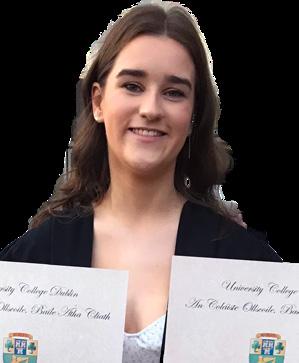
"I was privileged to be among eighteen Stage 2 and 3 UCD students who visited London on the Commercial and Corporate Law Study Trip in January 2024.
I went into the trip blindly and without any expectations of what we might encounter on our visits to the various firms lined up for us. From the moment I stepped foot into the offices of Hogan Lovells, I was taken by the scope and the scale of the work they do on a daily basis. I was in awe of the transactions and deals these firms are involved in as well as the major enterprises, financial institutions and multinational companies they represent when taking part in lucrative deals. Knowing that these transactions and deals are regularly making the front pages of the Financial Times and the Wall Street Journal, an ambitious chord was struck within me to one day be part of such a team. It’s really encouraged me to consider London as a place where I could undertake a training contract or as a place where I could potentially move to as a qualified solicitor.
It was very beneficial to hear from people at different stages in their legal careers, from first seat trainees all the way up to senior partners. It was refreshing to hear from partners, who have been working in law for twenty or thirty years, still excited and enthused about the work they do. They talked at length about the constant variation in the work they undertake and the thrill that comes with working as a team on a big transaction. In that vein, the trainee panels discussed their time at the firm so far, the seats of their training contract they enjoyed so far and considered qualifying into as well as the scope of the work they do.
This trip influenced my short and long-term career goals. Studying Law with French Law has made me keen on pursuing a career with an international focus and having had the benefit of attending this trip, London is exactly the type of international hub where I can picture myself in the future."
Each year the UCD Careers Network organises a week-long study visit to top commercial law firms in London. The programme provides students with an opportunity to network with key influencers, develop their industry knowledge, as well as a range of employability skills specific to the legal sector.
Many summer internship programmes/vacation schemes offered by large law and professional service firms are aimed at 2nd year students onwards and run to strict timetables. You could also consider arranging work experience with a smaller firm. In the current situation, some opportunities have gone online so consider exploring virtual internships too.
By reading newspapers and Twitter feeds on a daily basis and professional publications regularly e.g. The Economist and Law Society of Ireland Gazette, you will stay up to date on industry news. Review relevant career publications to gain additional insights such as Ireland’s Leading 100 Graduate Employers, Gradireland Sector Guides, and the Careers Network Entrepreneurship Guide.

The London Corporate and Commercial Law Trip has significantly influenced my career aspirations and better prepared me to pursue a legal career. Before the trip, I had not seriously considered working in law in London, unaware of the many opportunities available there. However, visiting top-tier corporate and commercial law firms like Linklaters and Kirkland & Ellis
transformed my perspective. Exposure to London's vibrant legal landscape through both established Magic Circle firms and American multinational firms broadened my awareness of the opportunities available in the city. Learning about the high calibre of work available in these firms and the prospect of handling high-profile, challenging cases and working with international clients distinguished the London firms and left me excited to pursue a career there.
We also visited the Francis Taylor Building Chambers, where I learned about the unique barrister system in England, which I was previously unfamiliar with. Learning about the benefits of working within an organisation rather than independently has made me seriously reconsider a career as a barrister, making this experience invaluable. The trip also offered networking opportunities, which I was initially apprehensive about. However, by actively participating, I learned how to navigate networking events effectively and gained confidence for similar occasions in the future. We also participated in commercial awareness workshops and Q&A sessions, which enhanced my knowledge of the legal sector and made me a stronger candidate for future opportunities with law firms. The skills, experiences, and network I gained from the trip have significantly impacted my career path. Following a successful application, I participated in an insight scheme with Linklaters and was selected as their UCD brand ambassador next year. I would not have been aware of these opportunities without the trip, so I strongly encourage others to apply and make the most of this experience.
"82% of employers offer work experience and internships and an average of 28% of graduates recruited by companies had previously completed an internship within the organisation. gradireland Graduate Salary & Graduate Recruitment
Trends Survey 2020
• A&L Goodbody
• Arthur Cox
• Byrne Wallace
• Eversheds Sutherland
• Holmes O’Malley Sexton
• Matheson
• McCann FitzGerald
• William Fry
• Allen & Overy
Insight experiences are commonplace within law firms, professional services and banks, and provide you with opportunities to gain a taster of a career within law or another area, and within different firms. Recruitment for aspiring solicitors begins earlier than for many other professions, so it is worth engaging with these opportunities from first year.
What are Insight Days?
Insight days have become increasingly popular over the last ten years, and are primarily aimed at first year students. Firms use different terminology for their first year programmes, so as well as insight days, you may hear reference to insight programmes/workshops, first year workshops, open days, Spring Weeks and first year vacation schemes.
They are essentially structured work experience programmes that last from one day up to one week. They usually take place in the firm's offices. They are designed to give a brief insight into the firm and life as a solicitor, and usually involve a range of activities such as presentations on life at the firm and typical work undertaken; networking with members of the firm (from trainee to partner level), workshops, group exercises, and an office tour.
What are the benefits of applying?
Participating in these programmes offers a really valuable tool when making decisions about your future career as you can really get to know a firm, its culture and the work they do. They are also a great way to demonstrate your commitment to a career in law and to build your network. Application deadlines vary, but are usually from the end of November to the start of January. The process is very competitive so make sure you spend enough time on your application so that it stands out for the right reasons.
• Clifford Chance
• Dentons
• Herbert Smith Freehills
• Linklaters
• Norton Rose Fulbright
• Pinsent Masons
• Slaughter and May
The BCL Internship Module LAW37680 is open to most BCL students in stage 3 .Legal internships are 14 weeks long and take place in Trimester 2. Students can apply for a variety of paid legal internships sourced by UCD Law School. Placement partners include large Irish law firms, smaller Irish law firms, international law firms, non-govermental organisations and in-house counsel in large companies. It is also possible to source your own internship.
The module provides students with the opportunity to apply the skills and knowledge they have already acquired at university to real-life situations and to further develop a range of workplace skills including teamwork, time management and communication skills. Phillip Howarth, UCD Sutherland's Internships Officer will assist students through the process and can be contacted through clec@ucd.ie. For details of Academic Internship Preparation Workshops make sure you check MyCareer.

Who should apply for internships and vacation schemes?
All large law firms offer internships or as they are called in the UK, vacation schemes, and they are aimed at second year students onwards.
When do internships take place?
Summer internships in Irish law firms are usually four weeks and for many firms, applications commence in January. UK Law Firms offer winter, spring and summer vacation schemes and applications usually open in September/October and close in December/January. Due to the current siutation, many internships are now being facilitated online, so be open to different types of experience.
Why should I do an internship?
Internships provide structured work experience, giving you the opportunity to work on live cases and transactions, and to shadow lawyers, sit in on client meetings and observe them giving legal advice. As well as helping you to improve your skills and legal knowledge, completing an internship could lead to an offer of a training contract as many employers use this as a major recruitment method viewing an internship as an extended interview.

I spent 5 months interning in RDJ in their general litigation department. The experience I gained was invaluable. I was unsure about pursuing a career in law until I started my internship, that had all changed as a result of my time in RDJ. The time I spent in RDJ enabled me to gain an insight into the legal world through various tasks such as court visits, developing briefs, research and drafting affidavits. I was lucky enough to work closely with a partner in the firm on a defamation case early on into my internship, which I was allowed to follow through to the end. I would highly recommend completing an internship as the knowledge and experience gained will stand to you throughout your degree and potentially your career. The best advice I could give to any student is you get out what you put in. Get involved in the company, ask questions, you’re there to learn so make the most of it. The careers network provides valuable information to guide you through the application process, use this information as it is extremely beneficial.
An important skill needed in this profession is attention to detail, which is something I had somewhat underestimated. It is extremely important that the small mistakes are caught as the stakes are higher than they would be should you have a typo in an assignment. This is a skill that can be developed through your studies in UCD and from my experience will only improve through your time on internship. I have learned through working in RDJ that a career in law doesn’t have to mean long hours and no life outside work. I was lucky enough to work in a firm that encourages a work life balance, which helped make the work far more enjoyable.

Earlier this year, I took part in the BCL student placement programme. I spent three months in Matheson’s Financial Institutions Group (FIG) where I worked throughout the Spring trimester. The team which I worked with was quite large and therefore every project I worked on was different from the last.
During these three months I was given opportunities to visit the High Court, attend client meetings, and I even had to give a presentation on an updated piece of legislation in front of my department.
I would encourage any student, who can partake in this programme to do so, and would advise them to participate in as many societies and events as they can. I personally found that joining the five-aside football team allowed me to become friendly with employees who I otherwise would not have had the chance to meet. The placement not only expanded my knowledge of the law and how it is practiced in a commercial firm, it showed me the importance of being able to work and get along with others
My time in Matheson gave me invaluable knowledge of the daily workings of a commercial solicitor. I did not know what to expect from a commercial law firm prior to the internship and was unsure whether working in one was where I wanted to be in the future. However, after spending three months in Matheson and enjoying (almost) every minute of my time there, I now see that qualifying as a solicitor is the career path for me.

"Corporate law firms exist to solve legal and commercial issues for their clients. To do that successfully, firms need to understand their clients' businesses, the context in which they operate and the issues they face. This requires recruiting candidates who demonstrate commercial acumen. To demonstrate commercial acumen in your interview, it is essential that you understand the firm's core client base and/or target client base and the key issues facing those clients. Your understanding should then allow you to engage in a discussion that demonstrates your commercial prowess. As a starting point, delve into the firm's website. There, you should find the firm's core client base and you may be able to gauge any clients the firm is targeting. Any recent content (article/webpages) should indicate the key issues the firm's clients are facing. To build a deeper understanding, it is vital that you also get up to speed on what is being reported in the media. If the firm is focused on tech companies, for example, get up to speed on what is being reported about Facebook, Google, other tech companies and the tech industry in general. Once you understand the issues the firm's clients are facing, you should also be thinking about how the firm might be able to support their clients in addressing those issues. For example, a newly introduced regulation that affects the tech industry might require tech companies to implement new policies that the firm could assist in drafting.
Some firms will require candidates to take part in an assessment day, as well as an interview. Find out early on what the assessment day will involve and familiarise yourself with whatever assessment style is involved. The assessment day might involve presenting to a group of partners. If so, before the day, practice as often as you can, presenting on varied topics before the mirror or, better yet, before an audience. The selection process might involve a critical thinking test, like the Watson Glasser Critical Thinking Test. If so, practice the test as often as you can before taking it. This will mean you are familiar with the format, type of thinking and timing involved."
Whilst most advice relating to interview preparation applies across all sectors, there are specific areas that you should focus on for interviews in corporate firms.
Employers will be looking to assess your level of commercial awareness so you should expect questions that require you to demonstrate business and legal knowledge, as well as provide insights. Here are a few examples;
• What is the business case for ensuring that organisations are diverse and inclusive?
• What opportunities and threats does rising environmental awareness among consumers present for companies?
• Why is health and safety compliance for businesses more important than ever?
• How is risk managed in M&A transactions?
• Are Irish lawyers prepared for the change and new possibilities promised by artificial intelligence?
Want to explore your career interests and options in more detail? - Book your appointment through MyCareer.

Whilst many law graduates choose to pursue a career within a law firm or as a barrister, that is not the only option when you graduate. In 2023 the top 6 employers of UCD law graduates were; KPMG, A&L Goodbody, Mason Hayes & Curran, Arthur Cox EY and McCann Fitzgerald, and alongside these employers our law graduates have gained employment across all sectors (private, public and not-for-profit).
You might want to consider working in industry as an in-house solicitor, where opportunities exist across a wide range of sectors. There are also a wide variety of business focused roles that law graduates are well skilled to enter including; accountancy and finance, analytics, project management, consultancy, marketing and advertising, HR and recruitment, sales, business development, operations and supply chain management. Graduate opportunities within these areas can be found in a wide range of businesses with the main sectors in Ireland being financial services, professional services, technology and start up’s, e-commerce, retail, pharmaceutical and engineering. UCD law graduates have secured employment in a wide range of organisations including; Jameson, Accenture, Facebook, KPMG, PwC, JP Morgan, State Street, Citi and Car Trawler.
Perhaps a career within the public sector appeals to you? There are many opportunities both in Ireland, within the EU and beyond. Examples of roles include; lawyer within EU institutions, administrative officer (policy development and managerial responsibilities), policy officer, diplomat, communications officer, researcher, and teacher. UCD Law graduates are working in organisations from the Department of Justice & Equality and the Department of Foreign Affairs and Trade, to the European Commission, European Data Protection Agency, and UN Office for the Coordination of Humanitarian Affairs.
The not-for-profit sector is also an option, working in a role where you are utilising your legal skills and knowledge or in another area such as campaigning, fundraising, communications or corporate social responsibility partnership management. UCD law graduates have secured opportunities in organisations such as; Rehab Group, Irish Red Cross, and Amnesty International.

"I work in the legislative review section of the Policy & Research department at IHREC where the majority of my time is spent researching and analysing policy papers, research reports, academic literature and case law and using my findings to develop internal briefing papers and IHREC publications. While the work I produce serves a much different purpose and strikes a different tone to my academic work the skills involved are extremely similar and so I have benefitted well from the research, writing and critical analysis skills I developed in my BCL –Law with Social Justice degree.
I was pretty much involved in all aspects of student life you can imagine. I was an UCDSCU class rep and Business and Law College Officer and also ran in two more elections. I played lacrosse throughout my four years at UCD and was the Club President in my final year. I also got to open up the Lawsoc debate every week in my second year as the Committee’s Records Secretary. I spent a year working in the SU library shop and in my final year I was the Student Brand Representative on campus for Red Bull.
I would advise students to get involved in as many things as they possibly have time for. Looking back it’s genuinely difficult to explain just how valuable all the different experiences on offer are and how they help you grow and develop as a person. Regardless of what you choose to take part in I think being able to demonstrate that you balanced work, life, school stands to you in the eyes of employers and these are the important things that can help you stand out in a field where everyone has the same degree as you."

Mariana Verdes, BA Economics & Politics, Masters Common Law
"I am a practising barrister in all areas of civil law including personal injuries, medical negligence, immigration and asylum law. Skills I have developed at UCD which have proved useful in my current role would be research skills, critical thinking skills and the ability to distil large volumes of information and identify the important information. I really gained a great mix of skills from combining Economics and Politics in my undergrad with Law at Master’s level. My advice to current students would be to step out of your comfort zone and make things happen. Everyone is starting afresh so don’t think you are the only one struggling to fit in or find like minded people. Identify something you are interested in, be it a sport or a society and just turn up and see what happens. Or if it’s something that’s not there already chances are there are others who also would join into whatever your idea may be so link up and set up a new society. I was involved in setting up, or perhaps more accurately reviving the chess society which was one of my favourite and most proud accomplishments. I am thrilled we managed to leave on campus a thriving society and the giant garden chess board for future students to enjoy and socialise around. I only wish I was still there to enjoy it also.
Most importantly, turn up and make the most of it as your time will fly and there’s nothing worse than looking back and regretting not having made the most of the incredible opportunities available in UCD. Through the setting up of the chess society I got to meet my hero- Judit Polgar (the greatest female chess player in history). You really can use the platform UCD provides to achieve the most incredible things. It only requires a little effort and teaming up with likeminded people (who will also become wonderful friends) and sometimes not accepting ‘no’ for an answer, all great lessons for life on the other side of college."
UCD Careers Network is unique in Ireland as we have a dedicated Career and Skills Consultant for Graduate Research students.The service provides:
• Confidential 1-1 (60 minute) coaching/career guidance sessions, to discuss career options, job search, interview preparation
• 1-1 (30 minute) CV/Application review sessions
• Regular group workshops on applications, interviews and networking and more
• Bespoke delivery of workshops and seminars within Schools
• Alumni and employer networking opportunities
• Regular e-bulletin focusing on training and development opportunities and curated list of job vacancies
You can read about these services in more detail on the website.
As a Graduate Research student you have access to the Early Career Researcher pages on our career management platform MyCareer. MyCareer has a wide range of resources including interactive tools, such as AI CV review and interview prep, e-learning content and the latest job opportunities. MyCareer is where you can also book one-to-one appointments, workshops and events, and review resources such as recordings of all our Early Career Researcher alumni events. You can come and see us anytime, it is never too early to start thinking about your career. You can also avail of our 1-1 service up to two years post graduation.
Please click on the link to find out more about doing a PhD in UCD.

As the Graduate Research Student Career & Skills Consultant, Ms Tara Hughes focuses on the mobility and competitiveness of Research Masters and Doctoral Candidates beyond the PhD. She works with individuals and groups on planning how to find meaningful and rewarding careers. She does so by delivering a programme of professional skills training, 1-1 guidance and employer networking opportunities to enhance researcher competitiveness in a global environment.
In her previous role Tara worked as the Research Careers Manager (for Postdoctoral Staff & Research Fellows). Prior to that she was on the People and Organisation Development team in UCD HR developing programmes for Assistant Professors and new faculty. Her background is in Learning & Development, Organisation Development and as a HR Business Partner. She is a member of AHECS, AGCAS and the Association for Coaching. She is a UCD EDI Ambassador.


"The Global Campus of Human Rights is a network of 100 universities worldwide renowned for their leading role in education, research and advocacy for human rights and democratisation. We promote human rights and democratisation through regional Masters’ programmes, specialised trainings, research and outreach. I am the Director of the European master’s in Human Rights and Democratisation which is co-taught and co-implemented by 42 universities throughout Europe. I manage a resident team of five at our headquarters in Venice, and my responsibilities include research and teaching on topics related to human rights and democratisation, the overall academic coordination and implementation of the programme and its strategic development.
As this is an academic position the research and teaching skills I developed over the course of my doctorate are essential in my current role. In addition, I rely on many of the other skills I developed over the course of my research degree; written and oral communication skills, problem-solving and creative thinking skills, critical thinking, project management, leadership and resilience skills. I would strongly encourage graduate researchers to take advantage of all the training opportunities available to them through UCD and to devote regular time to mapping the many skills that research gives you so you can make them visible to yourself and future employers."
UCD Careers Network
Library Building
University College Dublin Belfield, Dublin 4
Ireland
Tel: +353 (0)1 716 7574
Email: careers@ucd.ie
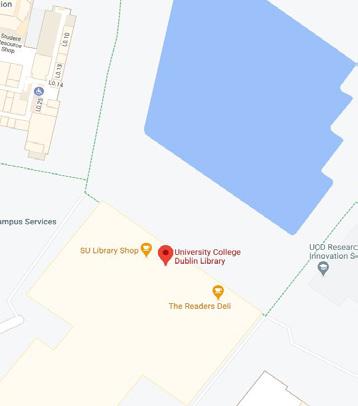
We are open Monday to Friday from 9am to 5pm.
You can find us on the corner of the James Joyce Library building; we have our own entrance next to the Campus Bookshop and opposite the main lake. The library building is no.34 on the Belfield Campus Map.

